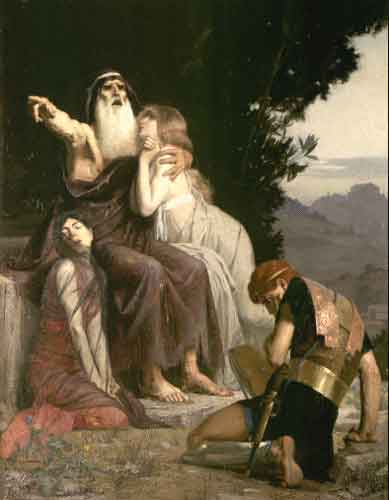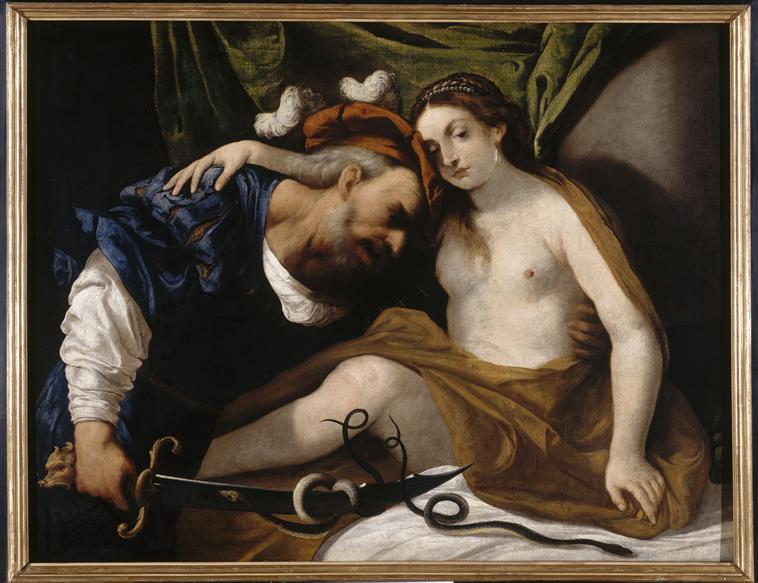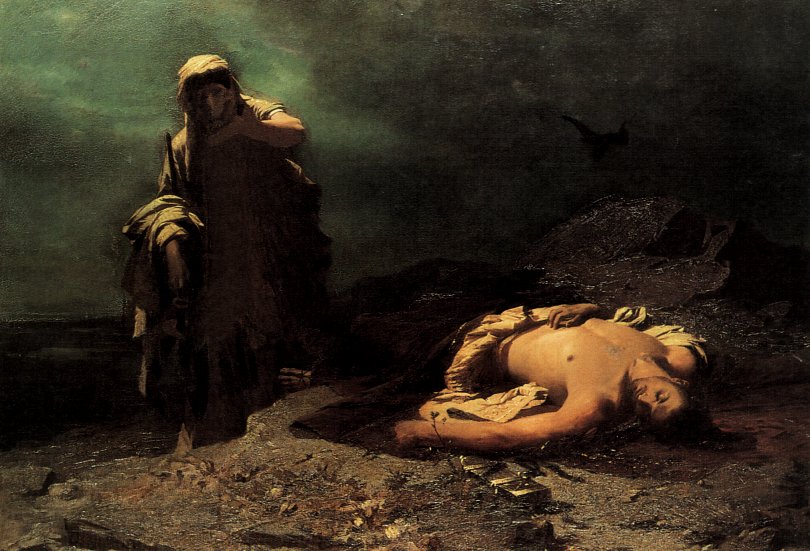|
Polyneices
In Greek mythology, Polynices (also Polyneices) (; grc, Πολυνείκης, Polyneíkes, lit= manifold strife' or 'much strife) was the son of Oedipus and either Jocasta or Euryganeia and the older brother of Eteocles (according to Sophocles' "Oedipus at Colonus"). When his father, Oedipus, was discovered to have killed his father and married his mother, he was expelled from Thebes, leaving his sons Eteocles and Polynices to rule. Because of a curse put on them by their father Oedipus, the two sons did not share the rule peacefully and died as a result, killing each other in battle for control over Thebes. Mythology Oedipus's curse In the ''Thebaid'', the brothers were cursed by their father for their disrespect towards him on two occasions. The first of these occurred when they served him using the silver table of Cadmus and a golden cup, which he had forbidden. The brothers then sent him the haunch of a sacrificed animal, rather than the shoulder, which he deserved. ... [...More Info...] [...Related Items...] OR: [Wikipedia] [Google] [Baidu] |
Sophocles
Sophocles (; grc, Σοφοκλῆς, , Sophoklễs; 497/6 – winter 406/5 BC)Sommerstein (2002), p. 41. is one of three ancient Greek tragedians, at least one of whose plays has survived in full. His first plays were written later than, or contemporary with, those of Aeschylus; and earlier than, or contemporary with, those of Euripides. Sophocles wrote over 120 plays, but only seven have survived in a complete form: ''Ajax'', ''Antigone'', ''Women of Trachis'', ''Oedipus Rex'', '' Electra'', '' Philoctetes'' and ''Oedipus at Colonus''. For almost fifty years, Sophocles was the most celebrated playwright in the dramatic competitions of the city-state of Athens which took place during the religious festivals of the Lenaea and the Dionysia. He competed in thirty competitions, won twenty-four, and was never judged lower than second place. Aeschylus won thirteen competitions, and was sometimes defeated by Sophocles; Euripides won four. The most famous tragedies of Sophocles feature ... [...More Info...] [...Related Items...] OR: [Wikipedia] [Google] [Baidu] |
Ismene
In Greek mythology, Ismene (; grc, Ἰσμήνη, ''Ismēnē'') is the daughter and half-sister of Oedipus, daughter and granddaughter of Jocasta, and sister of Antigone, Eteocles, and Polynices. She appears in several plays of Sophocles: at the end of ''Oedipus Rex'', in ''Oedipus at Colonus'' and in ''Antigone''. She also appears at the end of Aeschylus' ''Seven Against Thebes''. In Sophocles Oedipus Rex Ismene is not named, but is seen at the end of Oedipus Rex as her father/brother laments the "shame" and "sorrow" he is leaving her and her sister to. Oedipus begs Creon to watch over them, but in his grief reaches to take them with him as he is led away. Creon prevents him from taking his daughters out of the city with him. Oedipus at Colonus Ismene appears in Oedipus at Colonus to tell her father of the situation in Thebes and the rivalry of his sons. She explains that Eteocles has taken the throne from Polynices and driven him out of the city. As a result of this, ... [...More Info...] [...Related Items...] OR: [Wikipedia] [Google] [Baidu] |
Argia Of Argos
In Greek mythology, Argia or Argea (Ancient Greek: Ἀργεία ''Argeia'') was a daughter of King Adrastus of Argos, Peloponnese, Argos, and of Amphithea, daughter of Pronax. She was married to Polynices, the exiled king of Ancient Thebes (Boeotia), Thebes, and bore him three sons: Thersander (Epigoni), Thersander, Adrastus (mythology), Adrastus, and Timeas. Mythology When Oedipus had died at Thebes, Argia came with others to the funeral of Oedipus, her father-in-law.''Scholiast on Homer, Il. xxiii. 679;'Hesiod''. Catalogue of Women Fragment 24''./ref> After their father's death, Polynices was to rule Thebes with his brother Eteocles on alternating years. Eteocles ruled the first year. When the year was over for Eteocles, Polynices demanded the rule. Eteocles refused to yield it and so Polynices sought out help from King Adrastus. Polynices begged an army from King Adrastus for recovering his father's kingdom from his brother Eteocles. King Adrastus not only gave an army b ... [...More Info...] [...Related Items...] OR: [Wikipedia] [Google] [Baidu] |
Benjamin-Constant Antigone Au Chevet De Polynice (2007 6 1)
Jean-Joseph Benjamin-Constant (also known as Benjamin-Constant), born Jean-Joseph Constant (10 June 1845 – 26 May 1902), was a French painter and etcher best known for his Orientalism, Oriental subjects and portraits. Biography Benjamin-Constant was born in Paris. He studied at the École des Beaux-Arts, Ecole des Beaux-Arts in Toulouse, where he was a pupil of Alexandre Cabanel. A journey to Morocco in 1872 strongly influenced his early artistic development and lead him to produce Romanticism, Romantic scenes under the spell of Orientalism. Among his noted works in this vein are ''Last Rebels'', ''Justice in the Harem'' (both in the Luxembourg Gallery), ''Les Chérifas'', and ''Moroccan Prisoners'' (Bordeaux). His large canvas, '':File:Benjamin-Constant-The Entry of Mahomet II into Constantinople-1876.jpg, The Entrance of Mahomet II into Constantinople'' (Musée des Augustins Toulouse), received a medal in 1876. After 1880, he changed his manner, devoting himself to mural ... [...More Info...] [...Related Items...] OR: [Wikipedia] [Google] [Baidu] |
Argos, Peloponnese
Argos (; el, Άργος ; grc, label=Ancient Greek, Ancient and Katharevousa, Ἄργος ) is a city in Argolis, Peloponnese (region), Peloponnese, Greece and is one of the List of oldest continuously inhabited cities, oldest continuously inhabited cities in the world, and the oldest in Europe. It is the largest city in Argolis and a major center for the area. Since the 2011 local government reform it has been part of the municipality of Argos-Mykines, of which it is a municipal unit. The municipal unit has an area of 138.138 km2. It is from Nafplion, which was its historic harbour. A settlement of great antiquity, Argos has been continuously inhabited as at least a substantial village for the past 7,000 years. A resident of the city of Argos is known as an Argive ( , ; grc-gre, Ἀργεῖος). However, this term is also used to refer to those ancient Greeks generally who assaulted the city of Troy during the Trojan War; the term is more widely applied by the Home ... [...More Info...] [...Related Items...] OR: [Wikipedia] [Google] [Baidu] |
Eurydice Of Thebes
In Greek mythology, Eurydice (; Ancient Greek: Εὐρυδίκη, ''Eὐrudíkē'' "wide justice", derived from ''ευρυς eurys'' "wide" and ''δικη dike'' "justice) sometimes called Henioche, was the wife of Creon, a king of Thebes. Family Eurydice was probably the mother of Creon's five children: Menoeceus (Megareus), Lycomedes, Haemon, Megara and Pyrrha. Mythology Sophocles' account She appears briefly in Sophocles' ''Antigone'' (as an "archetypal grieving, saddened mother" and an older counterpart to Antigone), to kill herself after learning, from a messenger, that her son Haemon and his betrothed, Antigone, have both died by suicide. She thrusts a sword into her liver and curses Creon for the death of her two sons: Haemon and Megareus. Haemon killed himself because his father Creon had unjustly locked Antigone in a tomb to eventually perish, to whom he was engaged. Statius' account When the seer Tiresias predicts that if a son of Creon voluntarily throws ... [...More Info...] [...Related Items...] OR: [Wikipedia] [Google] [Baidu] |
Haemon
According to Sophocles' play ''Antigone'', Haemon {{IPAc-en, ˈ, h, iː, m, ɒ, n or Haimon (Ancient Greek: Αἵμων, ''Haimon'' "bloody"; ''gen''.: Αἵμωνος) was the mythological son of Creon and Eurydice, and thus brother of Menoeceus (Megareus), Lycomedes, Megara, Pyrrha and Henioche. Polynices attacked Thebes with his supporters in the war of the Seven against Thebes. Both brothers died in the battle. King Creon, Oedipus' brother-in-law and the sons' uncle, decreed that Polynices was not to be buried or mourned in any way. Sentence of Creon Creon decreed that Antigone was to be thrown into a cave with one day's worth of food, despite her engagement to his son, Haemon. The gods, through the blind prophet Tiresias, expressed their disapproval of Creon's decision, which convinced him to rescind his order, and he went to bury Polynices. However, Antigone had already hanged herself on the way to her burial. When Creon arrived at the tomb where she was to be left, his ... [...More Info...] [...Related Items...] OR: [Wikipedia] [Google] [Baidu] |
Tiresias
In Greek mythology, Tiresias (; grc, Τειρεσίας, Teiresías) was a blind prophet of Apollo in Thebes, famous for clairvoyance and for being transformed into a woman for seven years. He was the son of the shepherd Everes and the nymph Chariclo. Tiresias participated fully in seven generations in Thebes, beginning as advisor to Cadmus himself. Mythology Eighteen allusions to mythic Tiresias, noted by Luc Brisson, fall into three groups: the first recounts Tiresias' sex-change episode and later his encounter with Zeus and Hera; the second group recounts his blinding by Athena; the third, all but lost, seems to have recounted the misadventures of Tiresias. Blindness and gift of prophecy Like other oracles, how Tiresias obtained his information varied: sometimes, he would receive visions; other times he would listen for the songs of birds, or ask for a description of visions and pictures appearing within the smoke of burnt offerings or entrails, and so interpret them. ... [...More Info...] [...Related Items...] OR: [Wikipedia] [Google] [Baidu] |
Antigone
In Greek mythology, Antigone ( ; Ancient Greek: Ἀντιγόνη) is the daughter of Oedipus and either his mother Jocasta or, in another variation of the myth, Euryganeia. She is a sister of Polynices, Eteocles, and Ismene.Roman, L., & Roman, M. (2010). The meaning of the name is, as in the case of the masculine equivalent Antigonus, "worthy of one's parents" or "in place of one's parents". She appears in the three 5th century BC tragic plays written by Sophocles, known as the three Theban plays, and she is the main protagonist of the eponymous tragedy ''Antigone''. In Sophocles The story of Antigone was addressed by the fifth-century BC Greek playwright Sophocles in his Theban plays: ''Oedipus Rex'' Antigone and her sister Ismene are seen at the end of '' Oedipus Rex'' as Oedipus laments the "shame" and "sorrow" he is leaving his daughters to. He then begs Creon to watch over them, but in his grief reaches to take them with him as he is led away. Creon prevents hi ... [...More Info...] [...Related Items...] OR: [Wikipedia] [Google] [Baidu] |
Creon Of Thebes
Creon (; grc, Κρέων, Kreōn, ruler), is a figure in Greek mythology best known as the ruler of Thebes in the legend of Oedipus. Family Creon had four sons and three daughters with his wife, Eurydice (sometimes known as Henioche): Henioche, Pyrrha, Megareus (also called Menoeceus), Lycomedes and Haimon. Creon and his sister, Jocasta, were descendants of Cadmus and of the Spartoi. He is sometimes considered to be the same person who purified Amphitryon of the murder of his uncle Electryon and father of Megara, first wife of Heracles. Mythology First Regency After the death of King Laius of Thebes by the hands of his own son Oedipus, Creon sat on the vacant throne and became the ruler of the kingdom. During this regency, Amphitryon arrived with his fiancée Alcmena and her half-brother Licymnius from Mycenae, seeking exile and purification for the death of his prospective father-in-law King Electryon, whom he accidentally had killed. Creon purified him, ... [...More Info...] [...Related Items...] OR: [Wikipedia] [Google] [Baidu] |
Antigone (Sophocles)
''Antigone'' ( ; grc, Ἀντιγόνη) is an Athenian tragedy written by Sophocles in (or before) 441 BC and first performed at the Festival of Dionysus of the same year. It is thought to be the second oldest surviving play of Sophocles, preceded by ''Ajax'', which was written around the same period. The play is one of a triad of tragedies known as the three Theban plays, following ''Oedipus Rex'' and ''Oedipus at Colonus''. Even though the events in Antigone occur last in the order of events depicted in the plays, Sophocles wrote ''Antigone'' first. The story expands on the Theban legend that predates it, and it picks up where Aeschylus' ''Seven Against Thebes'' ends. The play is named after the main protagonist Antigone. After Oedipus' self-exile his sons Eteocles and Polynices engaged in a civil war for the Theban throne, which resulted in both brothers dying fighting each other. Oedipus' brother-in-law and new Theban ruler Creon ordered the public honor of Eteocles an ... [...More Info...] [...Related Items...] OR: [Wikipedia] [Google] [Baidu] |
.jpg)






